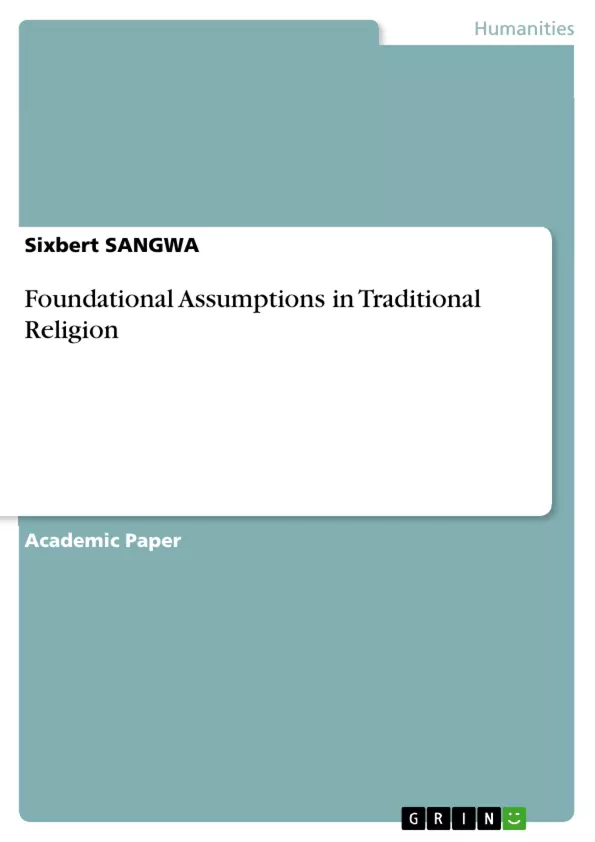This paper discusses the idea of the fundamental assumptions of traditional African religion. The author has attempted to locate the assumptions underlying the beliefs and practices of traditional religion. Although the assumptions put forward are not necessarily proven to be true; they are assumed to be true but simply form hypotheses. It has been claimed that the belief that the dead and ancestral spirits have authority over the living drives many practices into African traditional practices. These include the veneration of family ancestors, offering sacrifices to the deceased, divination aimed at seeking insights from ancestral spirits, and other rituals aimed at appeasing or thanking the ancestors. While God is the source of all life within African religions, an individual has life only when he participates in the life transmitted by God through the relationship of beings. The established hierarchy belongs to both the invisible world and the visible world so that Life is a participation in God, but it is always mediated by someone who stands above the recipient in the hierarchy of being. This ontological hierarchy places God first, spirits second as extra-human beings, and humans third. As a result, Human participation in God is participation in the ontological hierarchy, in which God transmits life through ancestors.
Inhaltsverzeichnis (Table of Contents)
- Introduction
- The Power of the Deceased
- Veneration of the Dead
- Offering Sacrifices
- Childbirth Rituals
- The Divination
- Seeking Advice from Ancestors
- Traditional Medicine
- Morality and Offenses
- Ontology, Hierarchy and the Unity of Life in Africa
- The Ontological Hierarchy
- The African Concept of Time
Zielsetzung und Themenschwerpunkte (Objectives and Key Themes)
This paper aims to delve into the foundational assumptions of traditional African religion. It seeks to identify and analyze the underlying beliefs and practices that form the bedrock of this religious system. While the assumptions presented are not necessarily proven to be true, they are considered hypotheses that provide a framework for understanding the complexities of traditional African beliefs.
- The centrality of ancestral spirits and their influence on the living
- The role of rituals and practices in maintaining harmony with the spiritual realm
- The importance of divination and traditional medicine in seeking guidance and healing
- The concept of an ontological hierarchy in which God, spirits, and humans occupy distinct yet interconnected positions
- The cyclical nature of time in African religious thought and the significance of the past in shaping the present
Zusammenfassung der Kapitel (Chapter Summaries)
The introduction establishes the context for the paper, highlighting the interconnectedness of the physical and spiritual realms in African traditional religion. The belief in a divine creator and the flow of life from this source are emphasized, along with the significance of ancestors in the community.
Chapter 2 explores the power attributed to deceased ancestors in African societies. It discusses the veneration of the dead, the offering of sacrifices, and rituals associated with childbirth. These practices stem from the belief that ancestors continue to exist in a spiritual realm and hold sway over the living.
Chapter 3 examines the practice of divination, which draws upon the belief in the ability of ancestral spirits to provide guidance and insight. Diviners are believed to have the capacity to communicate with the ancestors, offering knowledge about the future, traditional medicine, and ways to maintain harmony with the spiritual world.
Schlüsselwörter (Keywords)
The key concepts and themes explored in this paper include traditional African religion, ancestral spirits, divination, traditional medicine, ontology, hierarchy, unity of life, and the cyclical nature of time.
- Quote paper
- Dr. Sixbert SANGWA (Author), 2021, Foundational Assumptions in Traditional Religion, Munich, GRIN Verlag, https://www.grin.com/document/1025947



